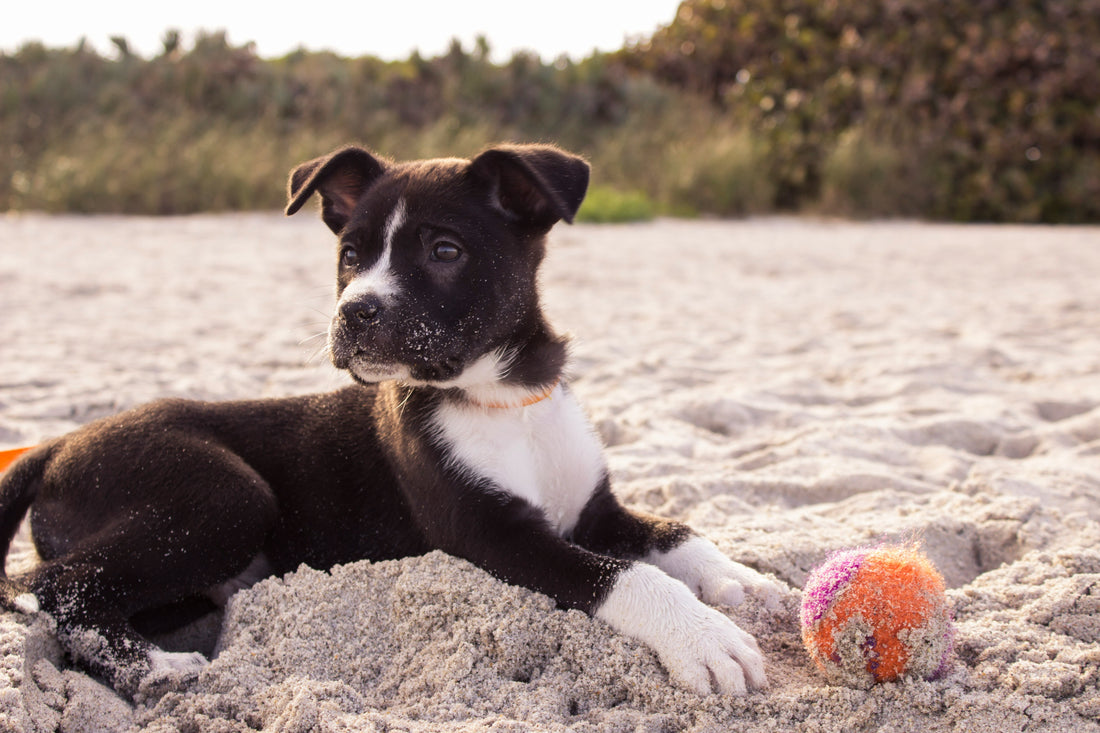What To Feed Dogs With Itchy Skin

Is your dog constantly scratching and biting at their skin? Itchy skin in dogs can be a symptom of underlying health issues.
If you’re struggling to understand why your dog is incessantly itching and what you can do about it, you’re in the right place. In this guide, we will go over the dietary changes and care tips you need to help soothe your dog’s irritated skin.
Identifying the Cause of Itchy Skin in Dogs
Itchy skin in dogs can stem from various causes, ranging from environmental factors and parasites to food allergies and dietary issues. Common allergens that may trigger skin irritation include certain proteins found in dog foods, environmental allergens like pollen or dust mites, and flea or tick infestations. It’s also possible that your dog’s diet lacks certain nutrients essential for maintaining healthy skin.
Consulting a veterinarian is crucial for a proper diagnosis. They can help identify whether your dog’s itchy skin is due to allergies, parasites, or other health issues. A vet may suggest an elimination diet to pinpoint food allergies or conduct tests to rule out other causes. Understanding the root cause is the first step in effectively treating your dog’s itchy skin.
Also read: How to Treat Allergy Bumps on Dogs
Dietary Changes for Dogs with Itchy Skin
Diet plays a pivotal role in managing itchy skin in dogs. If your dog’s skin issues are related to food allergies or sensitivities, switching to a hypoallergenic or limited-ingredient diet can make a significant difference. These diets typically feature novel protein sources, such as fish, lamb, or venison, which are less likely to cause allergic reactions compared to common proteins like beef or chicken.
Hypoallergenic dog foods often eliminate common allergens and use single protein sources to reduce the risk of triggering an allergic response. Limited-ingredient diets simplify the number of ingredients your dog is exposed to, making it easier to identify potential allergens. It’s important to gradually transition your dog to a new diet and monitor their response to identify which ingredients promote healthy skin and which may contribute to skin irritation.
Recommended Foods for Dogs with Itchy Skin
To fix your dog’s itchy skin, the right diet can be a game-changer. Feeding your dog nutrient-rich foods that support skin and coat health is essential. Look for dog food that is high in essential fatty acids, particularly Omega-3 and Omega-6, as these nutrients are vital for maintaining healthy skin. Fish oil, flaxseeds, and chia seeds are excellent sources of these fatty acids and can be found in many high-quality dog foods.
In addition to essential fatty acids, it’s important to choose dog foods with natural ingredients that promote skin health. Ingredients like sweet potatoes, blueberries, and leafy greens are not only nutritious but also less likely to cause allergic reactions. These foods are packed with vitamins and antioxidants that support overall health, including the skin.
However, it’s just as important to know which foods to avoid. Common allergens like beef, chicken, dairy, and wheat can often trigger skin irritation in sensitive dogs. Dog owners should be cautious about these ingredients, especially if their dog has a history of food allergies or sensitivities. By carefully selecting your dog’s food and paying attention to their reaction to different ingredients, you can significantly reduce their skin discomfort and promote healthy, itch-free skin.
Supplements to Support Skin Health
In addition to a well-balanced diet, certain supplements can play a crucial role in promoting healthy skin in dogs. These supplements can provide the extra boost needed to alleviate itchy and irritated skin.
Essential Fatty Acids (Omega-3 and Omega-6)
Omega-3 and Omega-6 fatty acids are vital for maintaining a dog’s skin health. They help in reducing inflammation, which can be a cause of itchy skin. Fish oil is one of the best sources of Omega-3 fatty acids and can be added to your dog’s diet either through fish-based dog foods or as a separate supplement. These fatty acids not only improve skin health but also contribute to a shinier and healthier coat.
Natural Supplements Like Fish Oil, Biotin, and Vitamin E
Biotin is a B vitamin known for its role in maintaining healthy skin and hair. It can be particularly beneficial for dogs with dry or itchy skin. Similarly, Vitamin E is an antioxidant that helps protect the skin from oxidative damage and supports skin healing. Supplements like Bando's Skin & Coat Soft Chews containing these vitamins can be a valuable addition to your dog’s diet. And if your dog's skin issues are caused by allergies, our Allergy Soft Chews will help fixing the problem.
Role of Probiotics in Maintaining a Healthy Gut and Skin
Probiotics play a significant role in maintaining a healthy gut, which is closely linked to skin health. A balanced gut microbiome can improve the overall immune system, reducing the likelihood of skin allergies and irritations. Probiotic supplements can help restore the natural balance of gut bacteria, promoting healthy skin from the inside out.
Home Remedies and Additional Care
Alongside dietary changes and supplements, there are several home remedies and care practices that can significantly soothe your dog’s itchy skin. These methods can provide immediate relief and promote long-term skin health.
Natural Remedies for Soothing Itchy Skin
Natural remedies can be effective in providing relief from itchy skin. Oatmeal baths are a popular choice for soothing irritated skin. The anti-inflammatory properties of oatmeal can help calm itchiness and reduce redness. Aloe vera, known for its healing and soothing properties, can be applied to affected areas to provide relief. However, ensure that any product used is safe for dogs and free from harmful additives.
Importance of Regular Grooming and Skin Care
Regular grooming is essential for maintaining healthy skin. Brushing your dog regularly helps to remove dead skin and hair, distribute natural oils, and stimulate blood circulation, promoting healthy skin and coat. Using hypoallergenic or oatmeal-based shampoos during baths can also help in soothing itchy skin. Be cautious not to over-bathe your dog, as this can strip away natural oils and exacerbate skin dryness.
Environmental Adjustments to Reduce Skin Irritation
Environmental factors can significantly impact your dog’s skin health. Reducing exposure to allergens like dust, pollen, and certain cleaning products can help prevent skin irritation. Ensure your dog’s bedding and living areas are clean and free from irritants. Humidifiers can also be beneficial in maintaining optimal humidity levels, especially in dry environments, to prevent skin from becoming too dry.
Schedule a Consultation with Our Team for Personalized Guidance
While the general guidelines and tips provided in this article can significantly help in managing your dog’s itchy skin, each dog is unique, and what works for one may not work for another.
Our team of experts is equipped to offer personalized advice that caters to your dog’s specific needs. By scheduling a consultation, you can receive tailored dietary recommendations and care plans that address the unique factors contributing to your dog’s itchy skin. We understand that factors like breed, age, overall health, and lifestyle all play a role in determining the best approach.
During the consultation, our team will conduct a thorough evaluation of your dog’s health, diet, and environment. We’ll discuss any current symptoms, previous health issues, and your dog’s dietary history. This comprehensive approach allows us to identify potential triggers and formulate a plan that not only relieves your dog’s current discomfort but also promotes long-term skin health.






